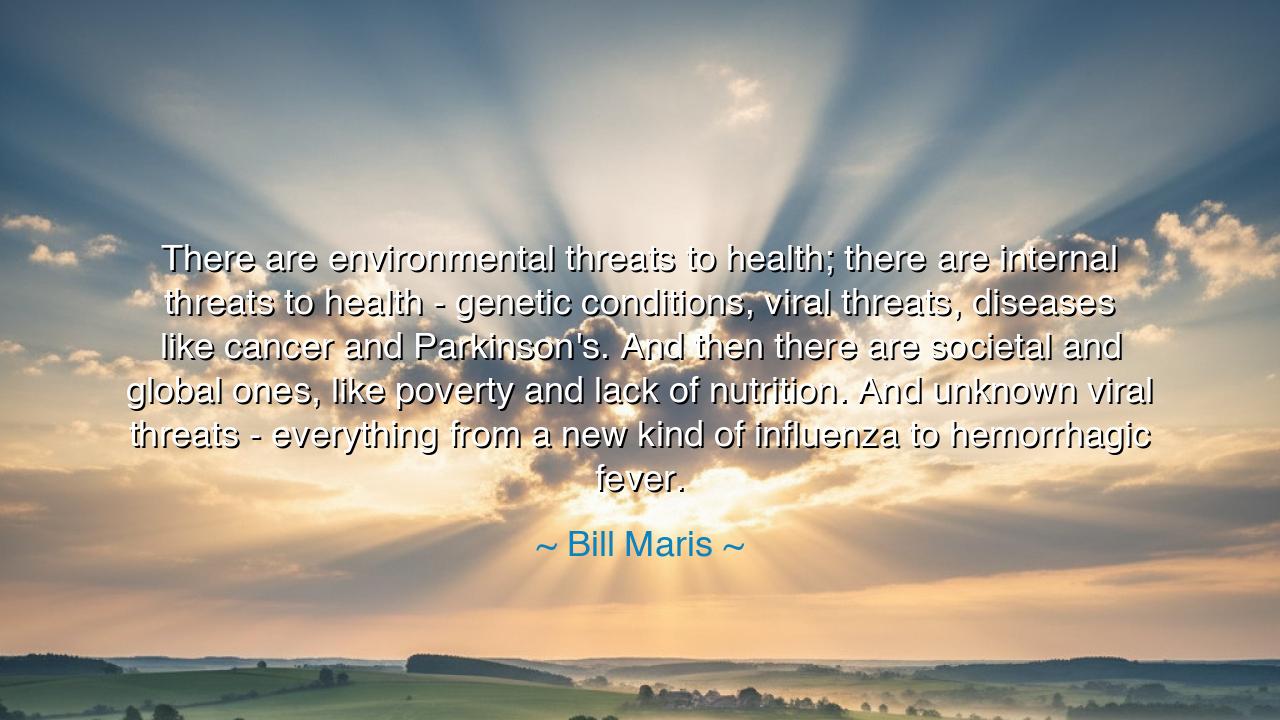
There are environmental threats to health; there are internal
There are environmental threats to health; there are internal threats to health - genetic conditions, viral threats, diseases like cancer and Parkinson's. And then there are societal and global ones, like poverty and lack of nutrition. And unknown viral threats - everything from a new kind of influenza to hemorrhagic fever.






The words of Bill Maris—“There are environmental threats to health; there are internal threats to health — genetic conditions, viral threats, diseases like cancer and Parkinson's. And then there are societal and global ones, like poverty and lack of nutrition. And unknown viral threats — everything from a new kind of influenza to hemorrhagic fever.”—are a meditation on the fragility of life and the interconnected nature of human suffering. In this statement, Maris, a pioneer in biotechnology and the founder of Google Ventures, does not merely speak as a man of science, but as a modern philosopher gazing upon the battlefield of existence. He sees that the struggle for health is not fought on one front, but on many—within the body, within society, and within the world itself. His words are a call to vigilance, wisdom, and compassion, reminding us that humanity’s quest for health is, at its heart, a quest for balance.
The origin of this thought lies in Maris’s work at the crossroads of technology, medicine, and biology. Having supported innovations in life sciences, from genetic research to medical AI, he has seen the full panorama of what threatens human survival—and what might save it. His list of dangers is both scientific and symbolic: environmental decay, representing the wounds inflicted by human hands; genetic and viral disorders, symbolizing nature’s inscrutable power; and poverty and malnutrition, embodying the injustices of human society. By naming these, Maris reminds us that health is not merely a biological state but a moral and ecological harmony. The health of one cannot be separated from the health of all.
To the ancients, this unity between body, environment, and society was sacred truth. The physician Hippocrates taught that illness arises when one lives out of balance with nature, that the winds, waters, and seasons shape the destiny of the human frame. Similarly, in the teachings of Ayurveda, disease was seen as a disorder not only of the flesh but of the spirit’s harmony with the universe. Maris’s insight revives this ancient wisdom in modern form: though our technologies are greater, our essence remains the same. The earth sickens, and so do we; society decays, and the cells within our bodies echo that decay. Health, then, is not merely a personal achievement—it is the expression of a world in equilibrium.
Consider the story of the Ebola outbreak in West Africa. What began as a viral infection became a mirror reflecting all the weaknesses of civilization. Poor infrastructure allowed the disease to spread; misinformation deepened the panic; poverty made containment nearly impossible. The virus itself was not the only enemy—the social fabric was. In contrast, when nations united with science, empathy, and discipline, the tide turned. This story proves the truth of Maris’s vision: that global health is a web, where the physical, the social, and the moral are intertwined. When one thread weakens, the whole structure trembles.
Maris’s mention of “unknown viral threats” is both prophecy and warning. Before the world had known the shadow of COVID-19, he already spoke of unseen dangers—the kind that remind humanity of its vulnerability. Yet, in his words, there is no despair. There is instead a challenge: to rise above ignorance and complacency. Humanity has always lived beside unseen threats, but what defines an age is whether its people choose fear or preparedness. The ancients built temples to the gods of health; today, our temples are laboratories and hospitals. But the reverence must be the same—the understanding that health is sacred, fragile, and must be guarded with devotion.
There is another truth hidden within his words: the equality of suffering. Cancer, poverty, viruses—they do not respect wealth or nation, creed or class. Yet, the means to fight them are unequally shared. Maris’s statement subtly condemns this imbalance. He reminds us that while science can cure, only justice can heal. A society that allows millions to die for lack of clean water while it engineers cures for the few has not yet achieved health—it has only achieved cleverness. To pursue health is to pursue fairness; to save lives is to honor life itself.
From this reflection, a lesson emerges worthy of inscription upon the walls of any age: health is the harmony of the self with the world. It is forged not by medicine alone, but by wisdom, compassion, and unity. Let each person, then, be a guardian of that harmony—by caring for the earth as they would for their body, by defending the weak as they would protect their own blood, by honoring knowledge as the highest form of worship. The battle for health is eternal, but so too is the human spirit that fights for it.
Thus, let us hear Bill Maris’s words not as a warning alone, but as a summons. He teaches that the threats we face—whether viral, genetic, or social—are not signs of doom, but invitations to rise in understanding. Humanity’s greatness will not be measured by how it conquers disease, but by how it learns from it—how it learns to build a world where science, compassion, and justice walk hand in hand. For when we heal the planet, when we lift the poor, when we guard one another from unseen harm, we do not merely protect life—we honor it.






AAdministratorAdministrator
Welcome, honored guests. Please leave a comment, we will respond soon